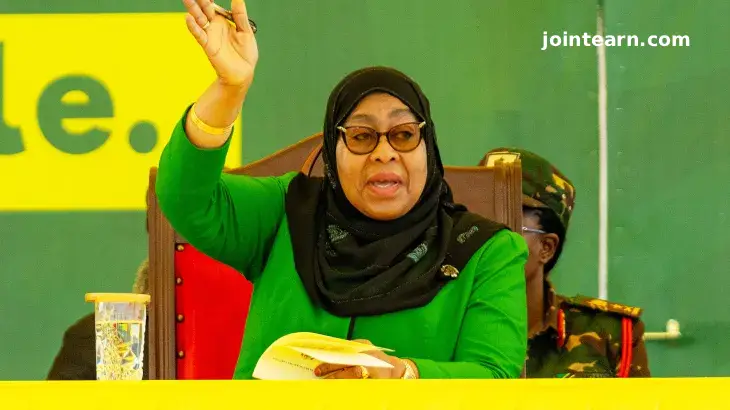
Tanzanian President Samia Suluhu Hassan has secured a landslide victory in a highly contentious election overshadowed by widespread unrest, allegations of political repression, and the exclusion of leading opposition figures. The result, announced by the country’s electoral commission on Saturday, showed Hassan winning 97.66% of the vote, dominating every constituency nationwide and effectively guaranteeing her continued hold on power.
A Highly Disputed Election in Tanzania
The presidential and parliamentary elections, held on Wednesday, were marred by controversy even before ballots were cast. Several opposition leaders, including high-profile figures like Tundu Lissu and Luhaga Mpina, were either barred from running or imprisoned on what critics say were politically motivated charges. These exclusions sparked violent protests across major cities, with thousands taking to the streets in what human rights advocates describe as a fight for democratic participation.
The main opposition party, Chadema, which was prohibited from participating in the vote, has openly rejected the results. Party spokesperson John Kitoka denounced the electoral process as fundamentally flawed:
“We are calling for the intervention by a credible body to oversee another fresh election,” Kitoka told AFP, labeling the results as “a mockery of the democratic process.”
Samia Suluhu Hassan Defends Election Amid Calls for Accountability
Following her victory, President Hassan addressed the nation from the administrative capital, Dodoma, praising her triumph while condemning ongoing dissent.
“The actions of the protesters are neither responsible nor patriotic,” she said, vowing to safeguard Tanzania’s stability: “When it comes to the security of Tanzania, there is no debate – we must use all available security avenues to ensure the country remains safe.”
State-run media confirmed that a swearing-in ceremony would take place later on Saturday, signaling a rapid consolidation of Hassan’s second term in office.
Violent Protests and Allegations of Mass Casualties
Demonstrations continued to intensify after the election, with reports of clashes between protesters and heavily armed police. Internet disruptions, allegedly orchestrated by the government, were reported by the watchdog NetBlocks, affecting social media and mobile networks in key regions.
Opposition monitors claim that the state’s response was brutal. According to Chadema, up to 800 people may have been killed during the protests—figures gathered from hospital networks and independent observers. However, the Tanzanian government has dismissed these numbers.
Foreign Minister Mahmoud Thabit Kombo refuted claims of excessive force when speaking to Al Jazeera:
“No excessive force has been used,” Kombo asserted. “We have no official figures confirming hundreds of deaths.”
In contrast, the United Nations Human Rights Office expressed grave concerns, stating that accurate reports confirm at least 10 protest-related deaths in three cities.
Global Concern Over Tanzania’s Democratic Future
President Hassan, Africa’s first elected female president, came into power in 2021 following the sudden death of her predecessor, John Magufuli. Initially viewed as a potential reformer, her administration has since faced mounting accusations of human rights abuses, crackdowns on civil society, and politically motivated detentions.
Opposition leader Tundu Lissu, jailed for months on treason charges tied to his calls for electoral reform, continues to deny the allegations. His incarceration has become a flashpoint in the growing movement against what some describe as a “wave of terror” under Hassan’s rule.
UN Secretary-General Antonio Guterres released a statement saying he is “deeply concerned” about the violence, urging Tanzanian authorities to respect human rights and allow peaceful assembly.
A Nation on Edge: What Comes Next?
The immediate future of Tanzania remains uncertain. With an opposition largely suppressed and international organizations raising the alarm, the situation poses a direct challenge to the country’s political stability and global standing.
Calls for an independent investigation into the election and related violence are growing louder, with human rights groups and Western governments watching closely. Whether pressure will mount for new elections or reforms remains to be seen as Hassan begins her new term amid both controversy and conflict.


Leave a Reply